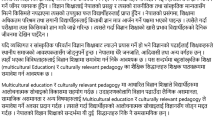When the humming bird comes, it is time for the seed to be planted. The humming bird never lies. (overheard from Zuni Tribe).
Abstract
In response to Meyer and Crawford’s article on how nature of science and authentic science inquiry strategies can be used to support the learning of science for underrepresented students, I explore the possibly of reconciliation between the cultures of school, science, school science as well as home. Such reconciliation is only possible when science teachers are cognizant of the factors affecting the cultural values and belief systems of underrepresented students. Using my experience as an Asian learner of WMS, I suggest that open and honest dialogues in science classrooms will allow for greater clarity of the ideals that WMS profess and cultural beliefs of underrepresented students. This in-depth understanding will eliminate guesswork and unrealistic expectations and in the process promote tolerance and acceptance of diversity in ways of knowing.
Executive summary
为了创建具有文化敏感度与包容性的科学课堂、我们需要审视教师对科学的理解以及重新考虑文化对科学学习的影响。如果教师不能认识到科学、文化、学校、科学教育与学习之间的复杂关系、科学就会变得非文化性、非历史性和教条主义。结果、学生在校学习不理想往往会归因于认知能力不足或者学习态度的缺失。Meyer and Crawford (2011) 指出、科学探索正如它所体现的和被理解的一样、能够潜在地将弱势学生所带入课堂的文化边缘化。这是因为我们描述和学习的主要是西方现代科学(WMS)。如果我们认为科学以及科学学习属于文化范畴、那么为了学习西方现代科学、学习者就必须学习并接受西方文化。因此、这些学习者个人文化的价值就会降低、因为他们需要学习和遵守孕育科学知识的西方文化。这也是课堂教学需要考虑的潜在领域、因为课堂具有多样性、同时由于很多学生的家庭文化有别于学校和科学文化、他们被看做是弱势群体。倾向于欧式传统的西方现代科学已经统治了“科学方法”、导致了更加狭隘而非多方面的研究世界的方法。为了实现多文化层面的科学学习、我们有必要突破西方现代科学的欧式传统、为学校文化习俗和学生文化标准的结合创造机会。在这两种文化之间寻找平衡会确保我们不会使西方现代科学处于特权地位而将弱势学生的家庭文化边缘化。这样的讨论为学生心声的表达打开了一扇门、我们可以知道学生赋予自己信念以及他们所学科学知识的价值。教育是一个经历和养成的过程、而这种对个人意义的探索只有与他人协作才能实现。因此、课堂不仅仅是交换知识的场所、也可以设计成为个人身份形成和文化生产之地。在科学课堂中、弱势学生也可以为他们自己和整个团体做出选择和决定。决定西方现代科学如何改变他们的人生、其中的哪些部分值得他们注意。学生的文化资本和科学内容需要得到同样的重视和强化、学生的文化知识可以作为科学探索和其他科学活动的平台。在学校科学学习中强调学生的文化经历有助于发挥他们对过去和现在的看法的作用、也同时会影响他们对当代科学知识的认识和理解。同样的科学知识用不同的方法来教、同时不同的学生以不同的方式经历科学、利用科学知识来改变他们的人生和社会。
Similar content being viewed by others
References
Aikenhead, G. S. (1996). Science education: Border crossing into the subculture of science. Studies in Science Education, 27, 1–52.
Allen, G., & Evans, M. D. (2006). Introduction: A different three Rs for education in context. In G. Allen & M. D. Evans (Eds.), A different three Rs for education: Reason, relationality, rhythm. Amsterdam: Editions Rodopi.
Bredo, E. (1994). Reconstructing educational psychology: Situated cognition and Deweyian pragmatism. Educational Psychologist, 29, 23–35.
Chee, Y. S. (2010). Studying learners and assessing learning: A process-relational perspective on the learning sciences. Educational Technology, September–October, 5–9.
Freebody, P., & Freiberg, J. (2006). Cultural science and qualitative educational research: Work ‘in the first place’ on the morality of classroom life. International Journal of Qualitative Studies in Education, 19, 709–722.
Gadamer, H. (1975). Truth and method. New York: The Seabury Press.
Heap, J. L. (1995). Understanding cultural science. Reading Research Quarterly, 30, 578–580.
Lederman, N. (2004). Syntax of nature of science within inquiry and science instruction. In L. Flick & N. Lederman (Eds.), Scientific inquiry and nature of science: Implications for teaching, learning and teacher education (pp. 301–317). Boston: Kluwer Academic Publishers.
Meyer, X., & Crawford, B. A. (2011). Teaching science as a cultural way of knowing: Merging authentic inquiry, nature of science, and multicultural strategies. Cultural Studies and Science Education. doi:10.1007/s11422-011-9318-6.
Mutegi, J. W. (2011). The inadequacies of “Science for all” and the necessity and nature of a socially transformative curriculum approach for African American science education. Journal of Research in Science Teaching, 3, 301–316.
Packer, M. J., & Goicoechea, J. (2000). Sociocultural and constructivist theories of learning: Ontology, not just epistemology. Educational Psychologist, 35, 227–241.
Rutherford, F. J., & Ahlgren, A. (1990). Science for all Americans. Oxford: Oxford University Press.
Author information
Authors and Affiliations
Corresponding author
Additional information
This review essay addresses issues raised by Meyer and Crawford in their paper entitled: Teaching science as a cultural way of knowing: Merging authentic inquiry, nature of science and multicultural strategies.
Rights and permissions
About this article
Cite this article
Tan, AL. Home culture, science, school and science learning: is reconciliation possible?. Cult Stud of Sci Educ 6, 559–567 (2011). https://doi.org/10.1007/s11422-011-9343-5
Received:
Accepted:
Published:
Issue Date:
DOI: https://doi.org/10.1007/s11422-011-9343-5




